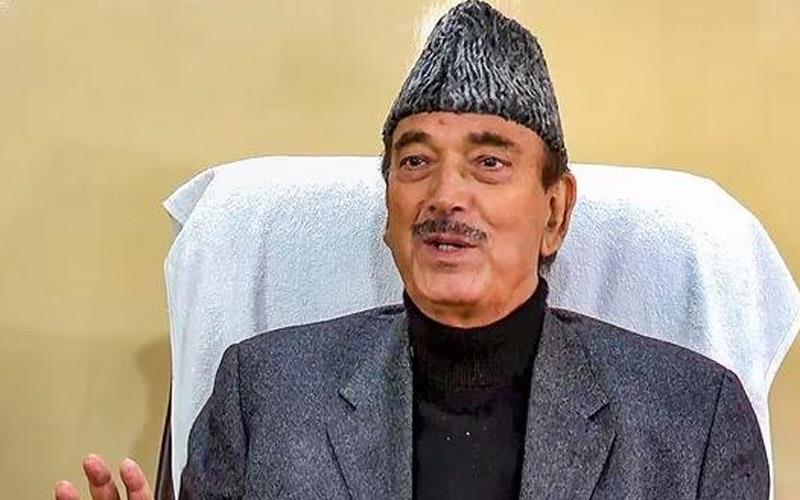Why Ghulam Nabi Azad is reluctant to contest from Anantnag-Rajouri seat
Ahmed Ali Fayyaz. Updated: 4/17/2024 12:30:55 AM
Front Page

SRINAGAR: For the first time in his over 50-year-long political career, Ghulam Nabi Azad has been nominated to contest a Lok Sabha election from a constituency in which he has never tried his luck. It is also for the first time that he would not be contesting as a candidate of the Congress party.
Seventy-five-year-old Azad, who resigned from Congress in 2022 and launched his own Democratic Progressive Azad Party (DPAP), does not need any introduction. He has served as a member of Lok Sabha, Rajya Sabha, Jammu and Kashmir Legislative Assembly, Union Cabinet Minister and Jammu and Kashmir’s Chief Minister before functioning as the Leader of Opposition in the Upper House of the Parliament for 10 years.
With the exclusion of three Assembly elections in Kashmir and two Lok Sabha elections in Jammu, Azad has contested most of his elections from outside his State of Jammu and Kashmir. This time, he has been nominated from the drastically reorganised and delimited constituency of South Kashmir which has 11 segments in Kashmir and 7 segments across the Pir Panjal mountain in Jammu’s Rajouri and Poonch districts.
This constituency of 18,28,863 voters is spread over 18 segments in Anantnag (07), Kulgam (03), Shopian (01), Rajouri (04) and Poonch (03) districts. While 10,93,617 voters are in Kashmir’s 11 segments, 7,35,246 are in Jammu’s 7 segments.
Days after his nomination, Azad has started blowing hot and cold about contesting from South Kashmir where only one of his former Congress loyalists, namely Mohammad Amin Bhat, has been a winner of the Assembly elections. Almost all of his former colleagues have either stayed back in Congress or shifted to other parties.
Senior Congress leader late Choudhary Mohammad Aslam’s son, Choudhary Akram, who was returned as MLA from Surankote in 2014, has lately joined the National Conference.
“Whatever his vote, is limited to Chenab valley wherefrom he has already fielded his old time colleague Ghulam Mohammad Saroori. Among many of the current candidates, Azad Sahab is very humane and popular but he has a very limited vote in Anantnag-Rajouri. If he chose to contest, he may be losing his security deposit for the first time in a Parliamentary election”, observed a political analyst. “For him, this constituency is illaqai-e-gair (other’s territory)”, he added.
Initially there was a grapevine that BJP would not field her own candidate and it would ‘silently’ support Azad who could bank on the Pahari vote-bank. The Pahari ethnic community is heavily inclined to vote for the BJP in exchange for the BJP Government’s favours—grant of Schedule Tribe (ST) with 10% dedicated reservation in the UT government jobs and scholarships and reservation of 9 seats for STs for the first time in J&K Assembly.
However, quite a number of the Paharis have been heard complaining that Azad was among the Congress leaders who failed the community’s aspirations for over 30 years. “Over 90 percent of us believe in ehsankebadleehsan but they will vote only for the BJP’s official candidate. At least never for Azad Sahab”, said a senior leader from the Pahari community.
Union Home Minister Amit Shah’s campaign address in Jammu on Tuesday has ruled out BJP contesting in Kashmir. “After today’s development, there’s a very bleak prospect of Azad’s jumping into the fray”, a senior Jammu-based journalist insisted.
Before contesting against BJP’s Dr Jitendra Singh from his home constituency of Udhampur-Doda in 2014—when Singh polled 4,87,369 votes and Azad 4,26,393—Azad had contested three times for J&K Assembly.
In 1977 he contested his maiden election from Inderwal and got a total of 959 votes, while losing his security deposit. He didn’t look back for the next 29 years.
In 2006, when he was already J&K’s Chief Minister, Azad contested the interim election for Assembly from Bhaderwah. He got a massive 62,072 votes and defeated the BJP’s Daya Krishen Kotwal with a margin of over 58,015 votes. Kotwal polled 4,057 votes. Azad’s winning margin remained unbeaten till 2014.
In 2008, after he lost power due to withdrawal of support by the PDP, Azad was again returned from Bhaderwah in the Assembly elections, this time getting 38,238 votes and defeating BJP’s Kotwal with a margin of 29,436 votes. But soon after that, he returned to national politics and became a Rajya Sabha member for a fourth term.
His first foray in the Lok Sabha elections was from Washim, Maharashtra in 1980 when he was growing up as Sanjay Gandhi’s poster boy. Azad secured 2,45,091 votes and won his first election with an impressive margin of 1,51,378 votes.
Over someone’s perfunctory reference to Azad’s victory, the Jammu and Kashmir National Conference’s founder and then Chief Minister Sheikh Mohammad Abdullah made an acerbic remark: “The day he will get 1,000 votes from anywhere in Jammu and Kashmir, I will recognise him as a political entity.”
Azad represented Washim in Lok Sabha for two terms from 1980 to 1989. Thereafter, he was elected as a member of Rajya Sabha several times. He worked as a Union Minister in different Congress regimes from 1982 to 2014.
After BJP’s virtual surrender in Kashmir on Tuesday, the situation is heading for a neck-and-neck contest between the National Conference and the PDP in South and Central Kashmir while a triangular contest looks likely between NC, PDP and the Peoples Conference in North Kashmir.
Updated On 4/17/2024 12:33:38 AM